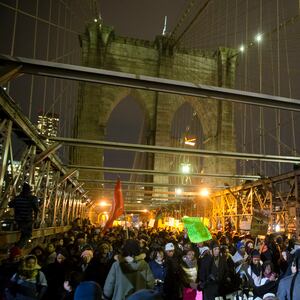Five years after Eric Garner’s dying plea, “I can’t breathe,” became the rallying cry against police brutality across the nation, the police officer who killed him has been fired.
New York City Police Commissioner James O’Neill announced his decision Monday to fire NYPD officer Daniel Pantaleo after it was found that he’d violated policy by restraining Garner with a prohibited chokehold in 2014.
“None of us can take back our decisions, especially when they lead to the death of another human being,” O’Neill said. “It is clear that Daniel Pantaleo can no longer effectively serve as a New York City police officer.”
During a 30-minute press conference, O’Neill painstakingly walked through the case, saying Pantaleo began his arrest with a legal maneuver and should have stopped. Instead, Pantaleo used a banned chokehold as he brought Garner to the ground and continued to choke him as he gasped for air.
O’Neill repeatedly said that Garner should not have resisted arrest in the first place but that officers should have waited for backup.
“A man with a family lost his life—and that is an irreversible tragedy. And a hardworking police officer with a family, a man who took this job to do good—to make a difference in his home community—has now lost his chosen career. And that is a different kind of tragedy.”

New York Police Department Commissioner James P. O’Neill speaks at a news conference at police headquarters in New York, Aug. 19, 2019.
ReutersO’Neill, who served as an NYPD officer and then commander for 34 years before becoming commissioner, choked up as he described watching the gruesome arrest video that informed his decision.
“Every time I watched the video, I said to myself, dozens of times, ‘Don’t do it. Don’t do it.’ I said that about the decisions made by both Officer Pantaleo and Mr. Garner,” he said.
The police commissioner said he might have made “similar mistakes” in Pantaleo’s situation.
“If I were still a cop, I would be mad at me," O’Neill said of his decision.
The police union that represents Pantaleo said Monday, and a NYPD official with direct knowledge later confirmed to The Daily Beast, that it had been in discussions as late as Friday to allow Pantaleo to resign and keep his full pension. The discussions broke down before O’Neill decided to terminate Pantaleo, leaving him with only his portion of his pension contribution.
Pantaleo’s lawyer said he plans to appeal the termination, with the goal of getting the officer’s job back. Meanwhile, the police union slammed O’Neill. Pat Lynch, president of the Patrolmen's Benevolent Association, said the commissioner chose “politics and his own self-interest over the police officers he claims to lead.”
An administrative judge previously recommended Pantaleo’s termination following an internal disciplinary trial. The judge, a deputy commissioner, found Pantaleo was “untruthful” during interviews with investigators and had “recklessly used force” during the fatal encounter.
Pantaleo had been placed on desk duty following Garner's death but had not faced official sanction until now. A Staten Island grand jury in 2014 declined to indict Pantaleo. The Justice Department in July declined to charge Pantaleo with violating Garner’s civil rights.
The city waited until the Justice Department investigation ended to render a decision on Pantaleo—a delay that O’Neill said he regrets.
“What have we learned from this case?” he said. “What I learned is we wouldn’t let this linger for five years, it’s too long. It’s unfair to the family, it’s unfair to everybody involved in this case.”
Following the police press conference, Rev. Al Sharpton spoke along with members of Garner’s family and commended O’Neill’s decision but called it “nothing to celebrate because Pantaleo will go home a terminated man but this family had to go to a funeral.” He again called for a law banning chokeholds, rather than just a departmental policy.
Garner’s daughter, Emerald Snipes, 26, wore a black t-shirt featuring a photo of Pantaleo covered by the word “Murderer.” She said her family won’t stop fighting for justice.
"Eric Garner was killed five years ago,” she said.”It took five years for the officer to be fired. I don't want another Eric Garner. I will do everything in my power to never see another Eric Garner."
O’Neill’s decision is the final act in a long legal and political drama over the fate of Pantaleo, who has personified for many critics what they say is the NYPD’s overly aggressive policing, including killings of unarmed black men such as Garner.
On July 17, 2014, Garner was confronted by NYPD officers on a Staten Island street corner after allegedly selling single “loose” cigarettes—prohibited by law.
Garner, 43, tried to pull away from surrounding officers before Pantaleo used a chokehold that has been banned by the NYPD since 1993, according to police. Video of the encounter taken by Garner’s friend shows Pantaleo holding Garner in a chokehold for several seconds, even after the two men fell to the ground.
Garner yelled “I can’t breathe” 11 times during the incident as officers pressed him into the sidewalk. But it was not until after the officers heard Garner’s pleas that they called for an ambulance. Paramedics waited several minutes before giving Garner oxygen.
Garner was pronounced dead shortly after arriving at a local hospital, dying of what the city’s medical examiner called a “lethal cascade of events” begun by Pantaleo’s chokehold and ending in a cardiac arrest. The death was ruled a homicide.
His killing immediately galvanized the nascent Black Lives Matter movement, demanding police transparency and accountability, and prompted a reckoning in the city over how the police engage with residents.
Immediately after the video went viral, thousands of protesters occupied parks and highways across the city with signs bearing Garner’s face and slogans of “I can’t breathe.” Weeks later, rage over Garner’s death was joined by similar rage over the police killing of Michael Brown in Ferguson, Missouri.
Garner’s family, which received $5.9 million from the city in 2015 to settle their wrongful death claim, have been publicly devoted to holding the police accountable since his death.
Gwen Carr, Garner’s mother, has become a central figure in the Black Lives Matter movement, tirelessly urging elected officials and police to fire all the officers involved in her son’s death and criticizing what she has called a subsequent attempt to cover up systematic misconduct.
Garner’s 27-year-old daughter, Erica, participated in several “die-ins” to protest officer-related shootings and became one of the central figures pressing for criminal justice reform. She died in 2017 of a heart attack.
The road to Pantaleo’s firing began this spring at an internal department disciplinary hearing.
Prosecutors at the non-criminal trial argued at the hearing Garner was trying to talk the officers out of arresting him and did not pose a threat. Prosecutors also presented evidence showing Pantaleo used a takedown technique he had not been trained to perform and when it went wrong clasped his hands around Garner’s neck instead of letting go.
“Eric Garner didn’t swing or hit any of these officers. There were three other officers there that didn’t use a chokehold,” prosecutor Jonathan Fogel, who represented the city’s Civilian Complaint Review Board, said at the start of the hearing in May. “This officer didn’t let go even after Mr. Garner fell to the ground. When he locked his hands together, it became more than reckless.”
Pantaleo’s defense team, however, argued that Garner’s death stemmed from his pre-existing health issues, such as obesity and asthma, despite the medical examiner’s homicide finding. They also argued Pantaleo had used the authorized tactic to subdue Garner after he was resisting arrest.
NYPD chief administrative judge Rosemarie Maldonado concluded in her 46-page opinion after the trial that Pantaleo should be fired for using the “reckless” chokehold that killed Garner and for lying about it to investigators. (Her opinion was first published by The New York Times.)
The judge said Pantaleo’s repeated denials about using the move were “both implausible and self-serving” after reviewing the video of the incident. The chokehold, she said, “fell so far short of objective reasonableness that this tribunal found it to be reckless—a gross deviation from the standard of conduct established for a New York City police officer.”
In the last week, the decision was passed from Maldonado to First Deputy Commissioner Benjamin Tucker, the department’s second in command. Tucker agreed with the ruling to fire Pantaleo and sent his recommendation to O’Neill’s office on Friday.
The union that represents Pantaleo has argued that he has “done nothing wrong” and was made a political scapegoat after properly using a legal maneuver.
Garner’s death and the subsequent national criticism of his killing have long haunted other New York officials, including Mayor Bill de Blasio. In July, protesters twice disrupted the Democratic presidential debate in Detroit to protest de Blasio, shouting “Fire Pantaleo!”
On Monday, de Blasio said the NYPD has “changed profoundly” since Garner’s death.
“Today, we have finally seen justice done, he said. “Today, we saw the NYPD’s own disciplinary process act fairly and impartially.”






